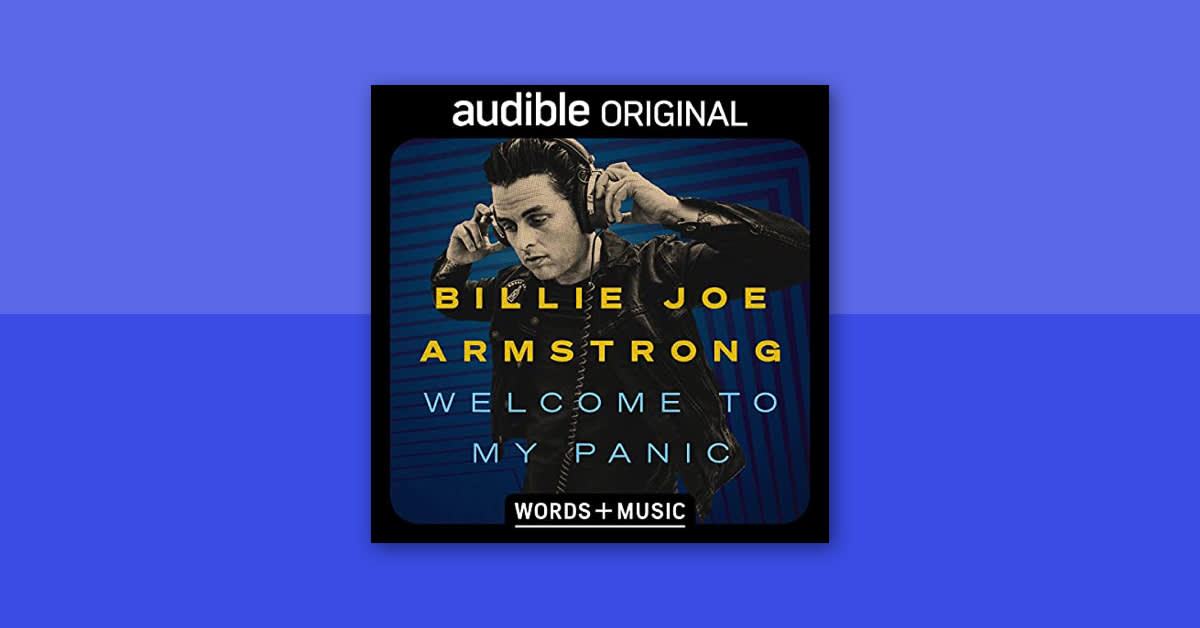With 17 Grammy nominations and four wins, Rock and Roll Hall of Fame status, and a legion of fans worldwide, Green Day is one of the most influential rock groups of all time. Bringing their DIY punk aesthetic and attitude to the mainstream with their breakout 1994 album, Dookie, the band gave voice to the angst of a new generation—an angst that was then released in the churn of mosh pits, driving riffs, and snarled, sardonic lyrics. Regardless of record deals or sales, Green Day's spirit of defiance and resistance to conformity has never deviated from their punk-rock roots.
At the group's helm is vocalist and guitarist Billie Joe Armstrong, a magnetic presence who also writes a majority of their lyrics. An icon in his own right, Armstrong has become a hero to many for his integrity and authenticity. In his Words + Music installment, Welcome to My Panic, Armstrong leads listeners through the defining moments of both his personal life and Green Day’s journey with the same soul that makes him a force onstage. Here are five of his most candid revelations.
Some quotes have been lightly edited for readability.
1. The loss of his father inspired one of Armstrong's most iconic songs.
In September of 1982, when Armstrong was in fourth grade, his father died after a brief but devastating battle with esophageal cancer. As Armstrong shares in Welcome to My Panic, his father was a jazz drummer as well as a truck driver. The family home was often alive with the hum of the radio and the sound of music. Armstrong recounts dreading returning to school, fearing he'd be set apart as "that kid with the dead parent,” as if “there was something missing.”

Armstrong discusses childhood after his father's death
<a href=https://www.audible.com/pd/Welcome-to-My-Panic-Audiobook/B0929HF74W>Welcome to My Panic
“When kids were looking at me, it was almost like I had a ghost over my shoulder...It was almost like my life started at zero again.”
The deep and relentless sting of grief is nearly palpable on the 2004 track “Wake Me Up When September Ends,” a song that's largely inspired by Armstrong's loss, the collective trauma of living in the wake of the tragic events of 9/11, and the annual sting of a death anniversary, sorrow renewed and remembered. The lyrics, among the band's most deeply personal, resonate with universal connection: “Here comes the rain again, falling from the stars, drenched in my pain again becoming who we are, as my memory rests but never forgets what I lost.” It's both a touching tribute to his father and an inclusive anthem that nods to our shared struggles.
“That song, I feel, was sort of a new breakthrough for me. I started thinking about how September is just really hard for everybody. The summer's over, a lot of people are going back to school, vacation's over, it's the beginning of the fall, everything is changing, it's getting colder out. And I think that's what that song means to me.”

Breaking new emotional ground with "Wake Me Up When September Ends"
<a href=https://www.audible.com/pd/Welcome-to-My-Panic-Audiobook/B0929HF74W>Welcome to My Panic
2. Green Day's origins involved Ozzy Osbourne and a Troll doll.
The relationship between Armstrong and Mike Dirnt, Green Day co-founder and bassist, goes way, way back. The future punk rockers met in elementary school, a few months before Armstrong's father passed away. Armstrong remembers Dirnt as a lively pal with a repertoire of jokes and a Troll doll in his pocket. Needless to say, the pair became fast friends.
“One of my first conversations that I ever had with Mike was about music. I think it was the first thing we ever talked about. I think we talked about Ozzy a little bit, and then I brought him home because I was like, 'Hey, this guy has got an interest in music!'”
Dirnt and Armstrong co-founded their first band, Truant, when they were only 13 years old. In Welcome to My Panic, Armstrong recalls sitting in their childhood bedrooms learning how to play songs together, from Def Leppard's “Photograph” to “Ain't Talkin' 'Bout Love” by Van Halen.
“I can remember it vividly: we had twin beds and I was sitting on one bed and he was sitting on the other side, and we were just sitting there strumming along and playing these songs.”

From classmates to best friends to bandmates
<a href=https://www.audible.com/pd/Welcome-to-My-Panic-Audiobook/B0929HF74W>Welcome to My Panic
3. He tied the knot in a BYOB “punk wedding.”
On Green Day's first tour back in 1990, fresh off their debut studio album, Billie Joe Armstrong met his future wife, Adrienne Nessler—after a basement show in Dinkytown, Minneapolis. Based on the strength of their initial encounter, the couple began to correspond via snail mail.
“We kind of became pen pals and just wrote letters back and forth and had this long distance sort of affair back and forth. It was...like, Is this going to happen? Is this not going to happen?”
After years of friendship and flirting with romance, Armstrong says he “convinced her to just come move out to California,” as Nessler was already considering a move to either the West Coast or New York City. Shortly thereafter, the pair were married, right around the time “Basket Case,” the second single from their iconic Grammy-winning album Dookie, dropped.
“I had this opportunity with this person that knew me from before and we were in love. And so it was like, let's tie the knot. So we got married and it was a BYOB kind of wedding. My friends were showing up with 40-ouncers. It was amazing. It was this punk wedding.”

Billie Joe and Adrienne tie the knot
<a href=https://www.audible.com/pd/Welcome-to-My-Panic-Audiobook/B0929HF74W>Welcome to My Panic
4. American Idiot was the band's first overtly political stance.
By 2004, punk juggernaut Green Day had six studio albums to their name. But that same year, they managed to break new ground yet again. American Idiot, billed as a punk rock opera with a strong narrative arc, arrived, offering catharsis for a generation struggling in the wake of a major act of terrorism and the dawn of the Iraq War. It became one of the best-selling albums of the decade, and the title track, a furiously satirical protest song, became one of the band's most recognizable hits.
“We got into a studio that was in Oakland that we just rented and we're like burning through money and just showing up every single day...And then I remember that's when 9/11 happened. And I think that just sort of changed the picture for us all together.”
Armstrong recalls writing the riff and lyrics for “American Idiot” before consulting Green Day bassist Mike Dirnt and drummer Tré Cool—who, fortunately, said they were "absolutely” cool with the song's outright political messaging. In Welcome to My Panic, Armstrong explains the band's creation of “something that's more anthemic” without “being pompous or pretentious.” And though “American Idiot” may have marked the group's most outspoken political statement, the front man is quick to note that taking a stand was routine for Green Day.
“I feel like I was approaching an anthem where it was like: ‘This is my love song. This is going to be my Declaration of Independence’.”

Armstrong discusses the thought process behind the band's anthemic tracks
<a href=https://www.audible.com/pd/Welcome-to-My-Panic-Audiobook/B0929HF74W>Welcome to My Panic
5. Sobriety was a life-or-death decision.
In Welcome to My Panic, Armstrong candidly admits that he's “pretty vulnerable to self-destruction.” Following the Broadway run of a stage musical based on American Idiot (in which Armstrong portrayed the “toxic” St. Jimmy for a span of a few months), he felt the stress of working on their next album, 21st Century Breakdown, begin to mount.
“I didn't want anybody to help... I think it was just the culmination of working that hard for so many years and feeling like I had to keep writing, writing, writing, writing, and losing kind of sight of just trying to take better care of myself.”
An ambitious and exhausting creative venture, the album (which Armstrong claims as one of his "favorite” Green Day records) became just as much a testament to the band's hard work and talent as a reminder of the internalized pressure to perform and continue to invent. To try and soothe the panic that overcame him, Armstrong routinely turned to a mixture of drugs and alcohol.
“I think I was just getting into a place where it was just getting scary and that if it kept going, I would end up fucking dead. So that's where I was like, 'OK, I need to evaluate life and make sure that I'm on the earth as long as humanly possible.' I went into rehab right after that.”

Rehab and the road to recovery from addiction
<a href=https://www.audible.com/pd/Welcome-to-My-Panic-Audiobook/B0929HF74W>Welcome to My Panic
Ready to hear more?
Audible's Words + Music series features the perspectives of musical icons—from Yo-Yo Ma to Alanis Morissette to James Taylor to Common—in a variety of genres, mixing the very best of memoir, performance, and creative commentary.




